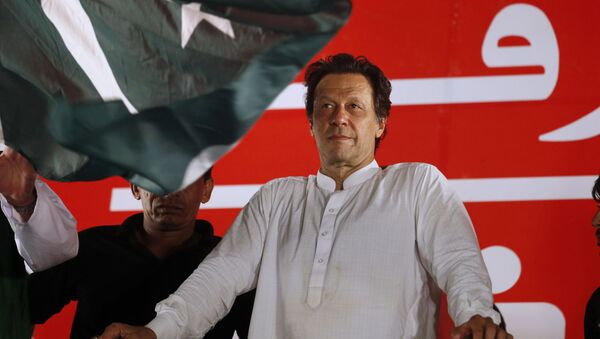Pakistani Prime Minister Imran Khan pointed out Monday that his country is not determined to be the first to resort to a nuclear war with India, amid ongoing tensions with the country's long-standing neighbouring rival.
"We both are nuclear-armed countries. If these tensions increase, the world could be in danger", Khan said addressing members of the Sikh religious community in the eastern city of Lahore.
"There will be no first from our side ever", he noted.
Earlier in the day, Pakistan's Railways Minister Sheikh Rashid Ahmed warned India of area-specific nuclear attacks with a series of minute atomic bombs. The minister went on to schedule the time for the imminent, according to him, war, arguing the appropriate time for a "final freedom struggle has come", and that the war with India would be the "last, this time". He mentioned, though, that dialogue is possible, provided India takes a step forward in resolving the Kashmir issue in accordance with United Nations resolutions.
Rashid Ahmed claimed that Pakistan has 125-250-gram nuclear bombs at its disposal, which can hit and destroy whatever targets Pakistan were to pinpoint. He also warned Indian Prime Minister Narendra Modi to avoid a war that may prove to be the "last" between the two nuclear-armed nations, which have seen a new low in tensions since New Delhi revoked the special status of the part of the disputed Kashmir and Jammu region under its control by amending Article 370 and 35A of the Constitution on 5 August, thereby repealing the special status of the state and dividing the territory into two federally administered enclaves - Jammu and Kashmir and Ladakh.
Pakistan strongly condemned India's move, with the country's Prime Minister Imran Khan even likening India to Nazi Germany and saying that his troops and people are ready to fight New Delhi until the end.
Last week, Pakistan made headlines as it moved hundreds of its troops and elite commandos close to the Line of Control (LoC), a 450-mile long military line demarcated in 1972 to serve as a de-facto border separating the contested region of Kashmir between the two nuclear-armed neighbours.
The territory of Kashmir has been an apple of discord between the two countries since they both gained freedom from British colonial rule in 1947 - the time when both started to govern the province in part but claim the whole of it, both at a time, which led to a number of armed conflicts. Despite a ceasefire having been reached in 2003, instability in the region has continued. Tensions soared earlier this year when the Indian military conducted airstrikes in response to an attack allegedly orchestrated by a terrorist group operating from the Pakistani-administered side of Kashmir.




